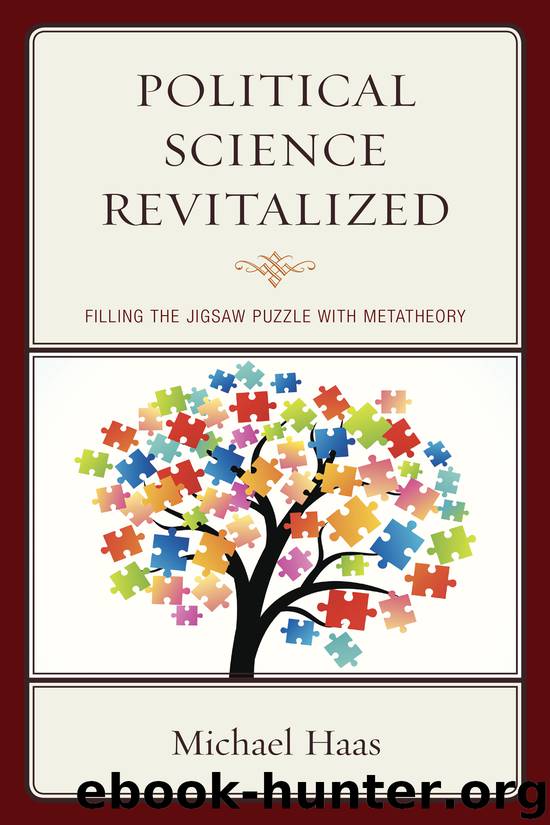Political Science Revitalized by Michael Haas

Author:Michael Haas
Language: eng
Format: epub
Publisher: Lexington Books, a division of Rowman & Littlefield Publishers, Inc.
Part IV
THE FUTURE OF POLITICAL SCIENCE
Having demonstrated the content of many paradigms and the way in which some of them can be tested, political science cannot continue to be mired in mid-level theories that are disconnected from one another. A new chapter in political science must begin, albeit a continuation of an agenda established more than fifty years ago that was interrupted by a fascination with other matters.
Propositions seeking relationships between independent variables and dependent variables abound in the field. Surely qualitative and statistical researchers are tired of endless tests of mid-level theory. The time has come to put together individual studies into a larger paradigmatic framework, either inductively from an aggregation of similar mid-level studies or deductively from paradigms. Unfortunately, most scholars may have been ignorant of the quest, expressed some fifty years ago, to construct macrolevel theory—paradigms. That time has arrived so that the field can advance beyond the appearance of disciplinary amateurism.
Chapter 10, accordingly, makes suggestions for improvements in how systematic research can be conducted in the future. Some of the ideas date back many years but have been forgotten. Other ideas have never before been raised. The focus is on selection of the research problem, conceptual schemes, research designs, sampling, causal analysis, policy relevance, and some common fallacies.
Chapter 11 highlights cross-testing of alternative paradigms. Rather than proudly wearing the straightjacket of only one theory, political scientists need to test the predictions of two or more paradigms on the same body of information. Several examples, some already discussed earlier, are cited.
Chapter 12 provides the rationale for a new paradigmatic-based empirical approach. The term “neobehavioral,” which has been coined as the synthesis between behavioral and postbehavioral international relations, is defined in depth. The challenge is presented to the next generation of political science scholars to bring the field into full maturity.
Download
This site does not store any files on its server. We only index and link to content provided by other sites. Please contact the content providers to delete copyright contents if any and email us, we'll remove relevant links or contents immediately.
American Kingpin by Nick Bilton(3887)
Future Crimes by Marc Goodman(3600)
The Meaning of the Library by unknow(2572)
Inside the Middle East by Avi Melamed(2357)
Why Nations Fail: The Origins of Power, Prosperity, and Poverty by Daron Acemoglu & James Robinson(2299)
On Tyranny by Timothy Snyder(2232)
Living Silence in Burma by Christina Fink(2072)
Putin's Labyrinth(2022)
The Mastermind by Evan Ratliff(1938)
The Smartest Kids in the World by Amanda Ripley(1856)
Think Like a Rocket Scientist by Ozan Varol(1822)
Law: A Very Short Introduction by Raymond Wacks(1748)
It's Our Turn to Eat by Michela Wrong(1731)
The Rule of Law by Bingham Tom(1698)
Philosophy of law a very short introduction by Raymond Wacks(1672)
Leadership by Doris Kearns Goodwin(1641)
A Dirty War by Anna Politkovskaya(1633)
Information and Communications Security by Jianying Zhou & Xiapu Luo & Qingni Shen & Zhen Xu(1621)
Civil Procedure (Aspen Casebooks) by Stephen C. Yeazell(1557)
